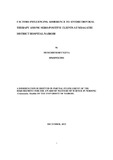| dc.contributor.author | Musembi, Mary N | |
| dc.date.accessioned | 2014-01-10T06:33:03Z | |
| dc.date.available | 2014-01-10T06:33:03Z | |
| dc.date.issued | 2013 | |
| dc.identifier.citation | Musembi Mary Nziva (2013). Factors Influencing Adherence To Antiretroviral Therapy Among Sero-positive Clients At Mbagathi District Hospital-Nairobi. Masters Of Science In Nursing (community Health) | en_US |
| dc.identifier.uri | http://hdl.handle.net/11295/62789 | |
| dc.description.abstract | Antiretroviral therapy (ART) has shown to improve the Health and prolong the lives of
most SERO-positive clients. As compared to other therapies, the efficacy of
Antiretroviral therapy depends on strict adherence to the regimen. This poses the greatest
challenges ever to many clients initiated on the therapy. Obtaining the full benefit from
the therapy is a complex individual behavioral process influenced by many broader
factors. The study sought to determine factors that influence Adherence to Antiretroviral
Therapy among the SERO-positive clients initiated on ART. A cross-sectional study
design was conducted at Mbagathi District Hospital, Comprehensive Care Clinic in the
months of July and August, 2013. Convenient sampling method was used to select the 85
respondents for the study. A structured-self administered questionnaire was used to
collect the data. It was then analyzed by use of Statistical Package for Social Sciences
(SPSS). Version 14-0. Relationships were determined by use of a chi- square test and a
P-value of less than 0.05 was considered to be significant.
The findings revealed gender inequalities in the study where more women (72.2%) were
infected with HIV/AIDS as compared to male's counterparts (27.8%). Most people
severely affected by the scourge were found to be from the child-bearing age group
between 15-49 years with majority (42.6%) aged between 25-34 years. Statistical
analysis also showed a significant relationship between age (25-34) and ART adherence
(P=0.039)educational levels was found to have no influence on ART adherence with
statistical analysis of (P=0.3). Majority (80%) of the respondents were found to be
knowledgeable about ART. Statistical analysis showed significant relationship between
ART adherence and knowledge (P=O.OOl. Despite this, stigmatization and discrimination
upon one's disclosure of HIV status was found to be on increase at (56.0%) and (24.1%)
respectively and was also found to influence ART adherence negatively. | en_US |
| dc.language.iso | en | en_US |
| dc.publisher | University of Nairobi | en_US |
| dc.title | Factors influencing adherence to antiretroviral therapy among sero-positive clients at Mbagathi district hospital-Nairobi | en_US |
| dc.type | Thesis | en_US |
| dc.description.department | a
Department of Psychiatry, University of Nairobi, ; bDepartment of Mental Health, School of Medicine,
Moi University, Eldoret, Kenya | |

